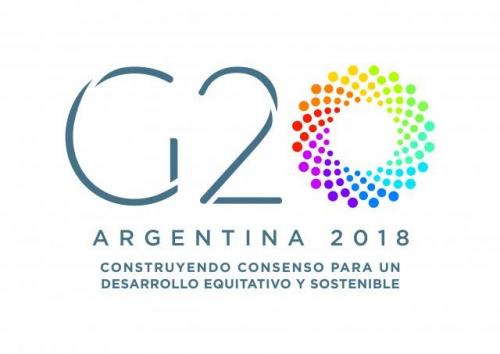G20 in Buenos Aires
In the midst of rising interest rates that could lead the world economy into a recession, there will be no discussion of financial issues that are very serious.
- Opinión

November 26 2018:- The G20 in Buenos Aires is opening with national rather than global agendas. Mexico is signing the free trade agreement ma non troppo with the United States in which Mexico promises to respect copyright on inventions for 70 years. The United States, for their part, and in reciprocity, maintain the tariffs of 25% and 10% on steel and aluminum. The trade war between the United States and China and between the United States and the European Union continues and the position of the United States towards NATO is one of hostility, creating the possibility that Germany and France may organize a military force outside of NATO in view of American sympathy toward the Russian position in Central Europe.
A divisive theme is the assassination of the journalist Khashoggi in the Saudi consulate in Istanbul, that Turkey insists was a State assassination by the Saudis. All are seated with the big negotiator doing everything possible so that it will not be noticed. Trump has important business relations with the Saudis. According to Business Insider, he said during the 2015 campaign “I get along great with all of them, they buy apartments from me.” Trump said, “They spend $40 million, $50 million. Am I supposed to dislike them? I like them very much”.
The question is whether the protection of the Saudis will come to light or whether they will keep it out of sight. The recent appearance of Trump in the United Nations Assembly in September, 2018, generated raucous laughter from heads of State from the rest of the world, an experience that it would be better not to repeat. The world gathered in the G20 will not protect an assassin state. Nor will it be able to avoid the economic problems of highly indebted economies in the face of rising interest rates and the fall of international trade.
Levels of public debt in the G20 . Threshold of danger = 60% Highly indebted countries over 60% of GDP
| |||
Argentina | 53% | India | 46% |
Australia | 64% | Indonesia | 28% |
Brazil | 73% | Italy | 157% |
Canada | 115% | Japan | 237% |
China | 44% | Korea | 40% |
France | 121% | Mexico | 53% |
Germany | 79% | Russia | 15% |
Saudi Arabia | 13% | United Kingdom | 109% |
South Africa | 51% | USA | 137% |
Turkey | 29% |
|
|
Source OECD Data and IMF Debt statistics
https://www.imf.org/external/datamapper/datasets/GDD
Other thorny issues include the tariffs against imports from the European Union. The fact of having broken with the multilateral system of trade is scarcely appreciated by Europe and by the Latin Americans, now tame dogs of Washington. Trump’s advantage is that the three Latin American governments will not take an adverse position under their present governments. The disadvantage is that the Asians will do so and they have much weight.
In this G20, in the midst of rising interest rates that could lead the world economy into a recession, there will be no discussion of financial issues that, as one can see from the above list, are very serious. The rise in interest rates will have repercussions for debt costs of the highly indebted wealthy countries of Europe, Canada, the United States and Japan. Every interest rate rise of 1% is equal to 1% of a GDP transfer from the Treasury to creditors, with the consequent budget adjustment, given the policies of inflation targets and the average 100% levels of debt of the GDP held by the G7 countries.
One theme that is being avoided, is the financial problems of the too-big-to-fail banks, whose share prices have been falling since 2008. Trump has been protecting the American banks (three banks out of 30) but he cannot protect the rest of the world. Basel III has been shown to be a fiasco that looks at bank credits while big banking is in reality dedicated to investment. This will not be touched. Meanwhile the diplomacy of the Yuan will follow. China already has more “too-big-to-fail” banks than the United States, but above all, what they have is world leadership, that the United States has lost, and money to make their offers effective.
We will see more bilateral agreements than a multilateral agreement that will now not be recognized by Washington, as with all the other multilateral agreements that it has. This meeting could be a waste of time, as it appears to be, or an occasion for the world to put a stop to the Saudi crimes and to reestablish a stronger multilateral posture on the part of all members, in particular the founder of multilateralism. It should be recalled that the host country of this G20 vetoed the participation of some 60 persons that would have attended the WTO meeting in December 2017, and several of them were denied a visa or deported, hence it lacks an internationally recognized democratic reputation.
(Translated by Jordan and Joan Remple Bishop)
- Oscar Ugarteche, Peruvian economist, is the titular researcher of the Instituto de Investigaciones Económicas UNAM (México), SNI/CONACYT, Coordinator of the Obela project www.obela.org.
Del mismo autor
- El multilateralismo bipolar 08/03/2022
- Bipolar multilateralism 07/03/2022
- What does 2022 bring? Uncertainty 31/01/2022
- ¿Qué trae el 2022? Incertidumbre 31/01/2022
- The most expensive Christmas of the century... (so far) 20/01/2022
- La navidad más cara del siglo (hasta ahora) 20/01/2022
- Lo que pasó en el 2021 10/01/2022
- What happened in 2021 10/01/2022
- Estados Unidos: el elefante en la habitación 08/11/2021
- The elephant in the room 07/11/2021








